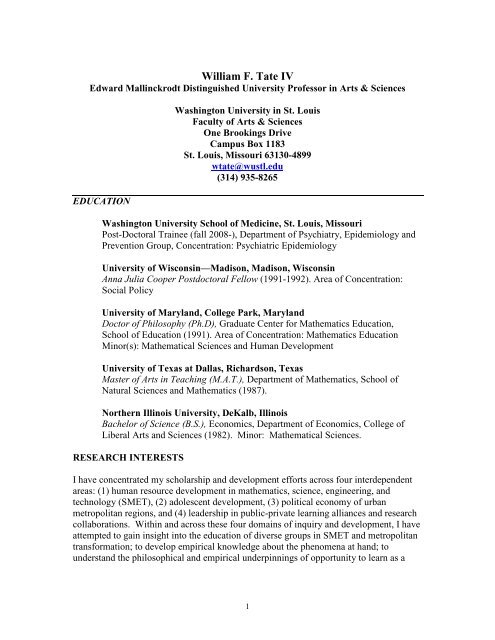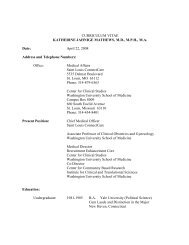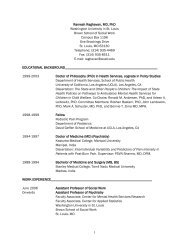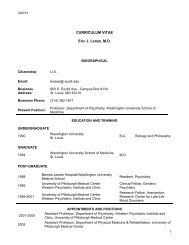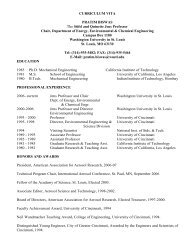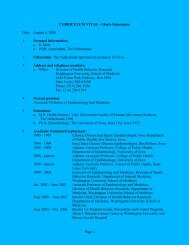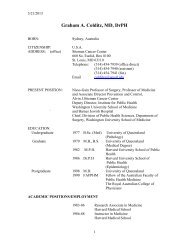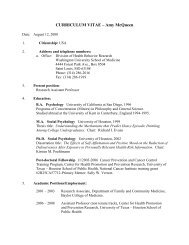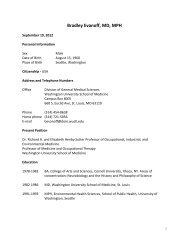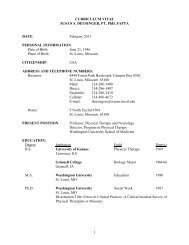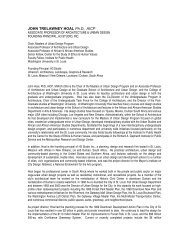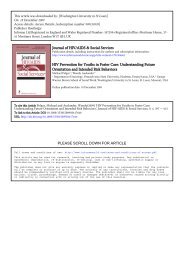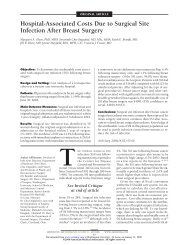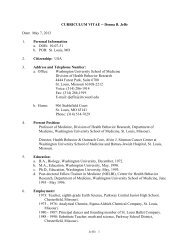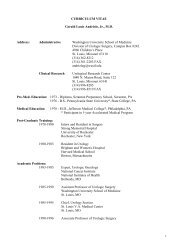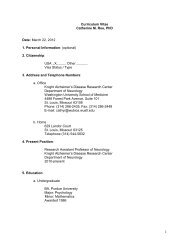William F. Tate IV - Institute for Public Health - Washington University ...
William F. Tate IV - Institute for Public Health - Washington University ...
William F. Tate IV - Institute for Public Health - Washington University ...
Create successful ePaper yourself
Turn your PDF publications into a flip-book with our unique Google optimized e-Paper software.
<strong>William</strong> F. <strong>Tate</strong> <strong>IV</strong><br />
Edward Mallinckrodt Distinguished <strong>University</strong> Professor in Arts & Sciences<br />
EDUCATION<br />
<strong>Washington</strong> <strong>University</strong> in St. Louis<br />
Faculty of Arts & Sciences<br />
One Brookings Drive<br />
Campus Box 1183<br />
St. Louis, Missouri 63130-4899<br />
wtate@wustl.edu<br />
(314) 935-8265<br />
<strong>Washington</strong> <strong>University</strong> School of Medicine, St. Louis, Missouri<br />
Post-Doctoral Trainee (fall 2008-), Department of Psychiatry, Epidemiology and<br />
Prevention Group, Concentration: Psychiatric Epidemiology<br />
<strong>University</strong> of Wisconsin—Madison, Madison, Wisconsin<br />
Anna Julia Cooper Postdoctoral Fellow (1991-1992). Area of Concentration:<br />
Social Policy<br />
<strong>University</strong> of Maryland, College Park, Maryland<br />
Doctor of Philosophy (Ph.D), Graduate Center <strong>for</strong> Mathematics Education,<br />
School of Education (1991). Area of Concentration: Mathematics Education<br />
Minor(s): Mathematical Sciences and Human Development<br />
<strong>University</strong> of Texas at Dallas, Richardson, Texas<br />
Master of Arts in Teaching (M.A.T.), Department of Mathematics, School of<br />
Natural Sciences and Mathematics (1987).<br />
Northern Illinois <strong>University</strong>, DeKalb, Illinois<br />
Bachelor of Science (B.S.), Economics, Department of Economics, College of<br />
Liberal Arts and Sciences (1982). Minor: Mathematical Sciences.<br />
RESEARCH INTERESTS<br />
I have concentrated my scholarship and development ef<strong>for</strong>ts across four interdependent<br />
areas: (1) human resource development in mathematics, science, engineering, and<br />
technology (SMET), (2) adolescent development, (3) political economy of urban<br />
metropolitan regions, and (4) leadership in public-private learning alliances and research<br />
collaborations. Within and across these four domains of inquiry and development, I have<br />
attempted to gain insight into the education of diverse groups in SMET and metropolitan<br />
trans<strong>for</strong>mation; to develop empirical knowledge about the phenomena at hand; to<br />
understand the philosophical and empirical underpinnings of opportunity to learn as a<br />
1
policy construct in local, state, and federal political discourse; and, to recommend policy<br />
and build alliances that will address the state of affairs.<br />
SCHOLARSHIPS, HONORS, AND FELLOWSHIPS<br />
• President, American Educational Research Association (2007-2008).<br />
The American Educational Research Association (AERA), founded in 1916,<br />
is the most prominent international professional society, with the primary goal<br />
of advancing education research and its practical application. Its 25,000<br />
membership is composed of researchers trained in a broad range of disciplines<br />
and fields including education, public policy, psychology, statistics,<br />
sociology, history, economics, philosophy, anthropology, law, political<br />
science, and medicine.<br />
• Edward Mallinckrodt Distinguished <strong>University</strong> Professor in Arts &<br />
Sciences, <strong>Washington</strong> <strong>University</strong> in St. Louis (2005- ).<br />
• <strong>William</strong> L. and Betty F. Adams Chair in Mathematics Education, Texas<br />
Christian <strong>University</strong>, College of Education and College of Science and<br />
Engineering (2001-2002).<br />
• Visiting Scholar, School of Natural Sciences and Mathematics, <strong>University</strong> of<br />
Texas at Dallas (2001).<br />
• Outstanding Scholar Award, <strong>University</strong> of Maryland, College of Education<br />
(2001).<br />
• Early Career Research Award, American Educational Research Association<br />
(2000).<br />
• Service Award, Mathematical Sciences Education Board, National Research<br />
Council (2000).<br />
• Outstanding Scholar Award, American Educational Research Association,<br />
Special Interest Group: Research Focus on Black Education (1998).<br />
• Co-Editor, American Educational Research Journal [Teaching, Learning and<br />
Human Development Section] (1997-2001).<br />
• Visiting Scholar, Faculty of Social Sciences, <strong>University</strong> of Umea, Sweden,<br />
(1996).<br />
• Ford Foundation Fellow, <strong>University</strong> of Ghana, Accra, Ghana (1993).<br />
2
• Anna Julia Cooper Post-Doctoral Fellow, <strong>University</strong> of Wisconsin—<br />
Madison (1991-1992).<br />
• Patricia Roberts Harris Doctoral Fellow, <strong>University</strong> of Maryland at College<br />
Park, The Graduate School (1988-1991).<br />
• Graduate Teaching Fellow, <strong>University</strong> of Maryland at College Park,<br />
Department of Mathematics (1989-1991).<br />
• Arco Scholar, <strong>University</strong> of Texas at Dallas, School of Natural Sciences and<br />
Mathematics, Department of Mathematics (1984-1986).<br />
• Undergraduate Teaching Fellow, Northern Illinois <strong>University</strong>, College of<br />
Liberal Arts and Sciences, Department of Mathematics (1982).<br />
UN<strong>IV</strong>ERSITY AND RESEARCH APPOINTMENTS [SELECTED]<br />
<strong>Washington</strong> <strong>University</strong> in St. Louis, 2002 to Present<br />
- Edward Mallinckrodt Distinguished <strong>University</strong> Professor<br />
in Arts & Sciences<br />
- Professor and Chair, Department of Education, Arts &<br />
Sciences. Provide leadership to support the advancement of<br />
academic programming, administrative services, financial<br />
planning and development activities of an academic unit<br />
consisting of 41 faculty members, research scientists,<br />
fellows, and staff.<br />
- Professor and Member, Executive Committee, American<br />
Culture Studies Program, Arts & Sciences<br />
- Professor(Affiliated) and Member, Executive Committee,<br />
Applied Statistics and Computation Program and Center,<br />
Arts & Sciences<br />
- Participating Professor, Program in Audiology and<br />
Communications Sciences—Speech and Hearing Sciences,<br />
Graduate School of Arts & Sciences<br />
- Professor and Member, Executive Committee,<br />
Interdisciplinary Urban Studies Program, Arts & Sciences<br />
- Chair, Executive Committee, Center on Urban Research<br />
and <strong>Public</strong> Policy, Arts & Sciences [Founding Member]<br />
3
- Principal Investigator and Director, Center <strong>for</strong> Inquiry in<br />
Science Teaching and Learning ($10,000,000 National<br />
Science Foundation Grant). The mission of the center is to<br />
develop an ongoing capacity to produce and diversify<br />
science education leaders, policy analysts, researchers, and<br />
practitioners who bridge research with practice to improve<br />
science teaching and learning across the education<br />
continuum. The center partnership includes <strong>Washington</strong><br />
<strong>University</strong> in St. Louis, <strong>University</strong> of Missouri—St. Louis,<br />
St. Louis Community College, Missouri Botanical Garden,<br />
Saint Louis Zoo, Saint Louis Science Center, Tyson<br />
Research Center, School District of <strong>University</strong> City, Saint<br />
Louis <strong>Public</strong> Schools, Kirkwood School District,<br />
Maplewood-Richmond Heights School District, and<br />
Riverview Gardens School District.<br />
Texas Christian <strong>University</strong>, Forth Worth, 2001-2002<br />
- <strong>William</strong> L. and Betty F. Adams Chair in Mathematics<br />
Education and Professor, College of Education and<br />
College of Science and Engineering<br />
<strong>University</strong> of Wisconsin—Madison, 1992-2002 [on leave 1999-2002]<br />
- Associate Professor, Mathematics Education Program<br />
- Assistant Professor, Mathematics Education Program<br />
- Senior Researcher, National Partnership <strong>for</strong> Excellence and<br />
Accountability in Teaching, Wisconsin Center <strong>for</strong><br />
Education Research.<br />
- Management Team Member and Senior Researcher,<br />
National <strong>Institute</strong> on Science Education, Wisconsin Center<br />
<strong>for</strong> Education Research<br />
- Senior Researcher, Wisconsin Center <strong>for</strong> Education<br />
Research, Case Studies of U.S. Innovations in<br />
Mathematics, Science, and Technology Education in an<br />
International Context<br />
4
OTHER PROFESSIONAL APPOINTMENTS [SELECTED]<br />
Dallas Independent School District, Dallas, Texas<br />
[12th largest school district in the United States—1. 4 billion dollar annual<br />
budget], 1999-2001; 1983-1988<br />
- Scholar-in-Residence and Assistant<br />
Superintendent−Mathematics and Science. Charged with<br />
district-wide responsibility <strong>for</strong> the mathematics and science<br />
education of over 161,000 students, 10, 474 teachers, and<br />
1,034 administrators. Managed the change process<br />
involved with systemic re<strong>for</strong>m in science, mathematics,<br />
engineering, and technology (SMET) education. Direct<br />
oversight responsibility <strong>for</strong> staff of 20. Developed the first<br />
multiple-year district-wide K-12 mathematics plan.<br />
Negotiated and managed multi-million dollar annual<br />
budget. Led the communication strategy designed to<br />
advance the message of SMET education <strong>for</strong> all students.<br />
Served as a member of the Superintendent’s Cabinet.<br />
(1999-2001)<br />
- Project Director and Co-Principal Investigator,<br />
Urban Systemic Re<strong>for</strong>m Program ($11,500,000) National<br />
Science Foundation Grant). The focus of this investment<br />
and scope of work was to catalyze system-wide policy<br />
alignment and coherence, enhance SMET curriculum and<br />
professional development while leveraging local, state, and<br />
federal fiscal resources. In addition, securing community<br />
partnerships and corporate support was an integral driver of<br />
the strategy. The main goal of the change strategy was to<br />
create a viable human resource development system that<br />
was capable of supporting the advancement of science,<br />
mathematics, and engineering attainment on a range of<br />
indicators. (1999-2001)<br />
- Project Director and Co-Principal Investigator, Infinity<br />
Project ($275,000 National Science Foundation<br />
Supplemental Grant). This project offered a new<br />
curriculum that prepared secondary students <strong>for</strong> the next<br />
generation of the In<strong>for</strong>mation Age. Based on principles of<br />
digital signal processing, students work on designs <strong>for</strong> new<br />
technologies, analyzed and experiment with wireless<br />
5
communication systems, and delved into the physics and<br />
engineering of computer chip fabrication. This learning<br />
alliance with Southern Methodist <strong>University</strong> and Texas<br />
Instruments expanded from seven comprehensive high<br />
schools to fourteen high schools in one academic year.<br />
(2000-2001)<br />
- Mathematics Instructional Specialist (K-12), Department of<br />
Curriculum and Instructional Support. Designed, managed,<br />
and supported the implementation of policy and programs<br />
in mathematics. (1986-1988)<br />
- Mathematics Teacher, W. T. White High School (1985-86)<br />
- Mathematics Specialist (grades 4-6), Project SEED (1984-<br />
1985) [This program utilized the Socratic method to teach algebra and<br />
other mathematical concepts to children underrepresented in the<br />
mathematical sciences.]<br />
- Mathematics Teacher, Woodrow Wilson High School<br />
(1983-84)<br />
Prince George's Community College, Largo, MD<br />
- Assistant Professor, Science, Technology, Engineering and<br />
Mathematics Division, Department of Mathematics (1988-<br />
1989)<br />
- Adjunct Faculty, Science, Technology, Engineering and<br />
Mathematics Division, Department of Mathematics (1989-<br />
1991)<br />
RESEARCH AND DEVELOPMENT SUPPORT [SELECTED]<br />
National Science Foundation (2003-2008). St. Louis Center <strong>for</strong> Inquiry in Science<br />
Teaching and Learning (CISTL), <strong>Washington</strong> <strong>University</strong> in St. Louis. Principal<br />
Investigator and Project Director. ($10,000,000)<br />
United States Department of Education (2004- ). The National Center <strong>for</strong> Culturally<br />
Responsive Educational Systems (NCCRESt), a project funded by the U.S. Department<br />
of Education's Office of Special Education Programs, provides technical assistance and<br />
professional development to close the achievement gap between students from culturally<br />
and linguistically diverse backgrounds and their peers, and reduces inappropriate referrals<br />
to special education. The project targets improvements in culturally responsive practices,<br />
early intervention, literacy, and positive behavioral supports. Co-Principal Investigator.<br />
($ 2,700,000)<br />
6
National Science Foundation (1999-2001). Urban Systemic Program, Dallas, Texas.<br />
Project Director and Co-Principal Investigator. ($11,500,000)<br />
National Science Foundation (2000). Implementing the Infinity Curriculum Project<br />
with the Dallas Independent School District (Multimedia Engineering <strong>for</strong> the Secondary<br />
Schools). Project Director and Co-Principal Investigator. ($275,000)<br />
National Science Foundation and United States Department of Education (1993-<br />
1995). Case Studies in U.S. Innovations in Mathematics, Science, and Technology<br />
Education in an International Context. <strong>University</strong> of Wisconsin—Madison, Wisconsin<br />
Center <strong>for</strong> Education Research, Senior Researcher.<br />
National Science Foundation (1995-1998), National <strong>Institute</strong> on Science Education<br />
(NISE), <strong>University</strong> of Wisconsin—Madison, Wisconsin Center <strong>for</strong> Education Research.<br />
Project title: Systemic Re<strong>for</strong>m and Policy Analysis. Member of Management Team and<br />
Senior Researcher.<br />
National Science Foundation, Mathematical Association of America, and Hewlett<br />
Packard (1995). Project title: Collegiate Curriculum Re<strong>for</strong>m and Community Action<br />
Project. Project Evaluator.<br />
Texas Education Agency (1993-1995). Project title: Higher Order Mathematics <strong>for</strong><br />
Teachers and Elementary School Students. Project Evaluator. ($12,000)<br />
Texas Education Agency and the Education <strong>for</strong> Economic Security Act Fund (1986-<br />
1988). Project Co-Director. ($105,000)<br />
PUBLICATIONS (SELECTED)<br />
Books and Edited Volumes<br />
<strong>Tate</strong>, W. F. (in preparation). From mortarboards to motherboards: The complexities and<br />
contradictions of systemic re<strong>for</strong>m in the Telecommunications Corridor. Contract with<br />
Lawrence Erlbaum, Mahwah, New Jersey. Expected date of completion: fall 2009.<br />
<strong>Tate</strong>, W. F. & C. C. Yeakey [Eds.] (in preparation). Research on schools,<br />
neighborhoods, and communities: Toward civic responsibility. [American Educational<br />
Research Association Presidential Volume, contract pending].<br />
Ladson-Billings, G. & <strong>Tate</strong>, W. F. [Eds] (2006). Education research in the public<br />
interest: Social Justice, action, and policy. New York: Teachers College Press.<br />
Artiles, A., Klingner, J. K., <strong>Tate</strong>, W. F. [Eds.] (2006). Representation of minority<br />
students in special education: Complicating traditional explanations, Educational<br />
Researcher, 35(6), 3-28.<br />
7
<strong>Tate</strong>, W. F. (2005). Access and opportunity to learn are not accidental: Engineering a<br />
mathematical revolution in your school. A monograph commissioned by the<br />
Southeastern Regional Vision <strong>for</strong> Education (SERVE), United States Department of<br />
Education.<br />
Strutchens, M. E., Johnson, M. L., & <strong>Tate</strong>, W. F. [Eds.] (2000). Changing the Face of<br />
Mathematics: Perspectives on African Americans. Reston, VA: National Council of<br />
Teachers of Mathematics.<br />
<strong>Tate</strong>, W. F. & D’Ambrosio, B. S. [Eds.] (1997, January). Equity, re<strong>for</strong>m, and research in<br />
mathematics education, Journal <strong>for</strong> Research in Mathematics Education, 28(6), 650-782.<br />
<strong>Tate</strong>, W. F. [Ed.] (1996, January). Urban schools and mathematics re<strong>for</strong>m: Implementing<br />
new standards, Urban Education 30(4), 379-521.<br />
Mathematics and Science Textbooks<br />
<strong>Tate</strong>, W. F. (2009). AMP Math System. Upper Saddle River, NJ: Pearson Education.<br />
<strong>Tate</strong>, W. F. [Program Co-Author] (2009). Scott Foresman ■ Addison Wesley<br />
Mathematics envisionMath©2009. New York: Pearson Education.<br />
<strong>Tate</strong>, W. F. [Program Co-Author) (2008). Cali<strong>for</strong>nia Science©2008. New York: Pearson<br />
Education.<br />
<strong>Tate</strong>, W. F. [Program Co-Author] (2006). Scott Foresman Science. New York: Pearson<br />
Education.<br />
<strong>Tate</strong>, W. F. [Program Co-Author] (2005). Scott Foresman ■ Addison Wesley<br />
Mathematics. New York: Pearson Education.<br />
<strong>Tate</strong>, W. F. [Program Co-Author] (2000). Cali<strong>for</strong>nia Mathematics. New York: Pearson<br />
Education.<br />
<strong>Tate</strong>, W. F. [Program Co-Author] (1999). The Path to Math Success. Parsippany, NJ:<br />
Silver Burdett Ginn.<br />
Human Capital Development: Mathematics and Science<br />
<strong>Tate</strong>, W. F. (accepted). “Geography of opportunity”: Poverty, place, and educational<br />
outcomes. Educational Researcher. Presidential Lecture, American Educational<br />
Research Association.<br />
<strong>Tate</strong>, W. F. (in preparation). Research and civic responsibility. In W. F. <strong>Tate</strong> and C. C.<br />
Yeakey [Eds.], Research on schools, neighborhoods, and communities: Toward civic<br />
responsibility. [American Educational Research Association Presidential Volume,<br />
contract pending].<br />
8
Rousseau, C. & W. F. <strong>Tate</strong> (in press). Still separate, still unequal: Democratic access to<br />
mathematics in the U.S. In L. English (Ed.), International handbook of research in<br />
mathematics education. London: Taylor and Francis.<br />
<strong>Tate</strong>, W. F. (2008). The political economy of teacher quality in school mathematics:<br />
African American males, opportunity structures, politics, and method. American<br />
Behavioral Sciences, 51(7), 953-971.<br />
<strong>Tate</strong>, W. F. (2007). Knowledge workers and the need <strong>for</strong> opportunity expansion regimes<br />
in urban America. National Education Association Research and Policy Brief Series.<br />
<strong>Washington</strong> DC: National Association of Education.<br />
<strong>Tate</strong>, W. F. & Rousseau, C. (2007). Engineering change in mathematics education:<br />
Research, policy, and practice. In F. Lester (Ed.), Second handbook of research on<br />
mathematics teaching and learning (pp.1209-1246). Charlotte, NC: In<strong>for</strong>mation Age.<br />
<strong>Tate</strong>, W. F. [issue researcher] (2006). Do the math: Cognitive demand makes a<br />
difference. Research Points: Linking Research to Education Policy. <strong>Washington</strong>, DC:<br />
American Educational Research Association.<br />
<strong>Tate</strong>, W. F. & Malancharuvil-Berkes, E. (2006). A contract <strong>for</strong> excellence in scientific<br />
education: May I have your signature please? Journal of Teacher Education, 57(3), 278-<br />
285.<br />
<strong>Tate</strong>, W. F. (2005). Brown, political economy, and the scientific education of African<br />
Americans. In R. Floden (Ed.), Review of Research in Education (pp. 147-184).<br />
<strong>Washington</strong> DC: American Educational Research Association.<br />
<strong>Tate</strong>, W. F. & Lipman, P. (2004). The changing nature of schooling and school<br />
demographics. In F. K. Lester & J. Ferrini-Mundy (Eds.), Proceedings of the NCTM<br />
research catalyst conference (pp. 125-131). Reston, VA: National Council of Teachers<br />
of Mathematics.<br />
<strong>Tate</strong>, W. F. (2004). What is a standard? In F. K. Lester & J. Ferrini-Mundy (Eds.),<br />
Proceedings of the NCTM research catalyst conference (pp. 15-23). Reston, VA:<br />
National Council of Teachers of Mathematics [SIRG Brief].<br />
<strong>Tate</strong>, W. F. (2004). Model-based mathematical languages as technological literacy:<br />
Some reflections on an urban school challenge. In R. B. Cooter (Ed.), Perspectives on<br />
rescuing urban literacy education: Spies, saboteurs, & saints (pp.135-151). Mahwah,<br />
New Jersey: Lawrence Erlbaum.<br />
<strong>Tate</strong>, W. F. and Rousseau, C. (2002). Access and opportunity: The political and social<br />
context of mathematics education. In L. English (Ed.), International Handbook of<br />
Research in Mathematics Education (pp. 271-300). Mahwah, New Jersey: Lawrence<br />
Erlbaum.<br />
9
<strong>Tate</strong>, W. F. (2002). African American children and algebra <strong>for</strong> all. In S. J. Denbo & L.<br />
M. Beaulieu (Eds.), Improving schools <strong>for</strong> African American Students (pp. 147-157).<br />
Springfield, IL: Charles Thomas.<br />
Rousseau, C. & <strong>Tate</strong>, W. F. (2003). No time like the present: Reflecting on equity in<br />
school mathematics. Theory into Practice, 42, 210-216.<br />
<strong>Tate</strong>, W. F. (2001). Science education as a civil right: Urban schools and opportunity to<br />
learn considerations. Journal <strong>for</strong> Research in Science Teaching, 38, 1015-1028.<br />
<strong>Tate</strong>, W. F. (2000). Some final thoughts on changing the faces of mathematics. In M.<br />
Strutchens, M. Johnson, and W. <strong>Tate</strong> (Eds.), Changing the faces of mathematics:<br />
Perspectives on African Americans (pp. 201-207), Reston, VA: National Council of<br />
Teachers of Mathematics.<br />
<strong>Tate</strong>, W. F., & Johnson, H. (1999). Mathematical reasoning and educational policy:<br />
Moving beyond the politics of dead language. In L. V. Stiff (Ed.), Developing<br />
mathematical reasoning in grades K-12 (pp. 221-233). Reston, VA: National Council of<br />
Teachers of Mathematics.<br />
<strong>Tate</strong>, W. F. (1998). Stating the obvious: Mathematics course taking matters. In F.<br />
Fennell, J. Gates, K. Johnston, & B. Wallace (Eds.), The nature and role of algebra in the<br />
K-14 curriculum. <strong>Washington</strong>, DC: National Research Council.<br />
<strong>Tate</strong>, W. F. (1997). Rethinking models <strong>for</strong> mathematics technology teacher education.<br />
In J. G. Harvey (Ed.), Mathematical Association of America Report #3 (pp. 121-125).<br />
<strong>Washington</strong>, DC: Mathematical Association of America.<br />
<strong>Tate</strong>, W. F. (1997). Race-Ethnicity, SES, gender, and language proficiency trends in<br />
mathematics achievement: An update. Journal <strong>for</strong> Research in Mathematics Education,<br />
28, 652-679.<br />
<strong>Tate</strong>, W. F. (1997). Brown, Sputnik, and mathematics re<strong>for</strong>m: Lessons from the past. In<br />
C. Teddlie & K. Lomotey (Eds.), Readings on Equal Education: Forty years after the<br />
Brown decision: The current and future sociological implications of school<br />
desegregation (pp. 251-264). New York: AMS.<br />
Webb, N., Heck, D., & <strong>Tate</strong>, W. (1996). A case study of the Urban Mathematics<br />
Collaborative. In S. A. Raizen & E. D. Britton (Eds.), Case studies in U.S. innovations in<br />
mathematics education (pp. 245-360). Dordrecht, The Netherlands: Kluwer.<br />
<strong>Tate</strong>, W. F. (1995). Returning to the root: A culturally relevant approach to mathematics<br />
pedagogy. Theory into Practice, 3, 166-173.<br />
10
<strong>Tate</strong>, W. F. (1995). School mathematics and African American students: Thinking<br />
seriously about opportunity-to-learn standards. Educational Administration Quarterly,<br />
31, 424-448.<br />
<strong>Tate</strong>, W. F. (1995). Mathematics communication: Creating an opportunity to learn.<br />
Teaching Children Mathematics, 6, 344-349, 369.<br />
<strong>Tate</strong>, W. F. (1995). La economía, la equidad y la evaluación nacional de matemáticas:<br />
¿Una vía nacional de peaje? In E. Fennema, W. G. Secada, & L. Byrd (Eds.), Equidad y<br />
enseñanza de las matemáticas: Nuevas tendencias (pp. 206-221). Madrid: Ministerio de<br />
Educación y Cultura. (In 1998, this chapter was reprinted in Spanish. The original<br />
publication date was 1995 [Cambridge <strong>University</strong> Press].<br />
<strong>Tate</strong>, W. F. (1995). Economics, equity, and the national mathematics assessment: Are<br />
we creating a national toll road? In E. Fennema, W. G. Secada, & L. Byrd (Eds.), New<br />
directions <strong>for</strong> equity in mathematics education (pp. 191-208). New York: Cambridge<br />
<strong>University</strong> Press.<br />
<strong>Tate</strong>, W. F. (1994, February). Race, retrenchment, and the re<strong>for</strong>m of school mathematics.<br />
Phi Delta Kappan, 75, 477-485.<br />
<strong>Tate</strong>, W. F. (1994, summer). Mathematics standards and urban education: Is this the road<br />
to recovery? Educational Forum, 58, 380-390.<br />
<strong>Tate</strong>, W. F. (1990). A model technology preservice program <strong>for</strong> secondary mathematics<br />
teachers. In N. Estes, J. Heene, & D. Leclercq (Eds.), Proceedings of the Seventh<br />
International Conference on Technology and Education (pp. 232-234). Edinburgh,<br />
Scotland, United Kingdom: CEP Consultants.<br />
Leadership and Research<br />
<strong>Tate</strong>, W. F. (2008). From the desk of the president—Research on schools, neighborhoods,<br />
and communities: Toward civic responsibility. Educational Researcher, 37(2), 106-107.<br />
<strong>Tate</strong>, W. F. (2008). From the desk of the president—Building a stimulating and<br />
sustainable research enterprise. Educational Researcher, 37(1), 51-52.<br />
<strong>Tate</strong>, W. F. (2007). From the desk of the president—Linking education research and<br />
civic responsibility: Why Now? Educational Researcher, 36(7), 408-409.<br />
<strong>Tate</strong>, W. F. (2007). From the desk of the president—“Translation research and public<br />
policy.” Educational Researcher, 36(5), 288-289.<br />
<strong>Tate</strong>, W. F. (2006). In the public interest. In G. Ladson-Billings & W. F. <strong>Tate</strong> (Eds.),<br />
Education research in the public interest: The place <strong>for</strong> advocacy in the academy<br />
(pp. 247-260). New York: Teachers College Press.<br />
11
Race and American Education<br />
Ladson-Billings, G. & <strong>Tate</strong>, W. F. (2006). Toward a critical race theory of education. In<br />
H. Lauder, P. Brown, J. Dillabough, & A, Halsey (Eds.), Education, globalization, &<br />
social change (pp. 570-585). Ox<strong>for</strong>d: Ox<strong>for</strong>d <strong>University</strong> Press. [reprinted with<br />
permission from Teachers College Record.]<br />
<strong>Tate</strong>, W. F. (2005). Ethics, engineering and the challenge of racial re<strong>for</strong>m in education.<br />
Race, Ethnicity and Education, 8(1), 121-127.<br />
Klingner, J. K., Artiles, A. J., Kozleski, E., Harry, B., Zion, S., <strong>Tate</strong>, W., Durán, G. Z., &<br />
Riley, D. (2005). Addressing the disproportionate representation of culturally and<br />
linguistically diverse students in special education through culturally responsive<br />
educational systems. Education Policy Analysis Archives, 13(38). Retrieved [November<br />
28, 2005] from http://epaa.asu.edu/epaa/v13n38.<br />
<strong>Tate</strong>, W. F. (1997). Critical race theory and education: History, theory and implications.<br />
In M. Apple (Ed.), Review of research in education (pp. 195-247). <strong>Washington</strong>, DC:<br />
American Educational Research Association.<br />
Ladson-Billings, G., & <strong>Tate</strong>, W. F. (1995). Toward a critical race theory of education.<br />
Teachers College Record, 97, 47-68.<br />
<strong>Tate</strong>, W. F. (1994, October). From inner city to ivory tower: Does my voice matter in<br />
the academy? Urban Education, 29, 245-269.<br />
<strong>Tate</strong>, W. F., Ladson-Billings, G., & Grant, C. A. (1993). The Brown decision revisited:<br />
Mathematizing social problems. Educational Policy, 3, 255-275.<br />
PRESENTATIONS (SELECTED)<br />
“Geography of Opportunity”: Poverty, Place, and Educational Outcomes, Presidential<br />
Address, American Educational Research Association, New York, New York, 2008.<br />
Science and Metropolitan America: Research and Civic Responsibility, <strong>University</strong> of<br />
Illinois, Bureau of Educational Research 2007-2008 Seminar Series, Urbana, Illinois,<br />
2008.<br />
The Political Arithmetic of Metropolitan Education: Moving Beyond Uncertainty in<br />
Mathematics, Engineering, Technology, and Science (METS) Leadership. Invited<br />
Keynote Lecture, National Council of Supervisors of Mathematics Annual Conference,<br />
Salt Lake City, Utah, 2008.<br />
12
Supporting the Advancement of Science Education with Geospatial Mapping, 13 th Annual<br />
Coalition <strong>for</strong> National Science Funding Exhibition, Rayburn House Office Building,<br />
<strong>Washington</strong>, DC, 2007.<br />
The Metropolitan Challenge in Science Education, Invited Speaker, Annual Meeting of<br />
the Consortium of Social Science Associations, <strong>Washington</strong> DC, 2007.<br />
Knowledge Workers and the Need <strong>for</strong> Opportunity Expansion Regimes in Urban<br />
America, Invited Keynote Lecture, National Education Association [Research Division],<br />
<strong>Washington</strong>, DC, 2007.<br />
The Political Arithmetic of Opportunity in Science. Invited Keynote Lecture, Benjamin<br />
Banneker Association National Forum, Georgia State <strong>University</strong>, Atlanta, Georgia, 2007.<br />
Educational Opportunity in an Emerging Biotechnology Region. Invited Keynote<br />
Lecture, <strong>University</strong> of Memphis, Urban Education Initiative, Memphis, Tennessee, 2007.<br />
Partnership, Civic Capacity, and Systemic Change in Science. Invited Lecturer, Dean’s<br />
Lecture Series, <strong>University</strong> of North Carolina, Chapel Hill, North Carolina, 2006.<br />
A Matter of <strong>Public</strong> Interest: Schools, Neighborhoods, and Social Inequality. Invited<br />
Lecturer, <strong>University</strong> of Maryland Provost’s Conversations on Diversity, Democracy, and<br />
Higher Education, College Park, Maryland, 2006.<br />
A Contract <strong>for</strong> Excellence in Scientific Education: May I have your Signature? Higher<br />
Education Symposium, St. Petersburg State <strong>University</strong>, St. Petersburg, Russia, 2005.<br />
Research in the <strong>Public</strong> Interest: A Compact in Need of a Signature. Invited Lecturer,<br />
Dan and Carole Burack President's Distinguished Lecture Series, <strong>University</strong> of Vermont,<br />
Burlington, Vermont, 2005.<br />
Ethics, Engineering, and Evaluation in Education. Invited Keynote Speaker, Martin<br />
Luther King Memorial Lecture, Vanderbilt <strong>University</strong>, Peabody College, Nashville,<br />
Tennessee, 2005.<br />
Moving Beyond Critique: Engineering, Evaluation, and Ethics as Foundations of<br />
Practice in Urban Education. Invited Keynote Speaker, Social Justice and Education<br />
Action Forum, <strong>University</strong> of Michigan, Ann Arbor, Michigan, 2005.<br />
From Mortarboards to Motherboards: Science, Global Society, and Urban Schooling.<br />
Invited conference speaker, Improving Education and <strong>Health</strong> through In<strong>for</strong>mation<br />
Technology: Global and Local Strategies, <strong>University</strong> of Memphis FedEx <strong>Institute</strong> of<br />
Technology, Department of Sociology, the In<strong>for</strong>mation Technology Division, and the<br />
Global Center <strong>for</strong> Education, Memphis, Tennessee, 2004.<br />
Brown: Future Considerations and Issues. Invited Lecturer, <strong>William</strong> C. Friday Lecture,<br />
North Carolina State <strong>University</strong>, Raleigh, North Carolina, 2004.<br />
13
Access and Opportunity to Learn are not Accidents: Engineering a Mathematical<br />
Revolution in your School. Annual Meeting of the National Council of Teachers of<br />
Mathematics, San Antonio, Texas, 2003.<br />
Leadership Opportunities in Urban School Mathematics and Science. Annual<br />
Conference of Leadership Dallas, Dallas, Texas, 2000.<br />
From Ivory Tower to Inner-City: The Challenges and Opportunities in Urban School<br />
Science and Mathematics. Invited Keynote Address, 14 th Annual Meeting of the<br />
<strong>University</strong> Council <strong>for</strong> Educational Administration, Albuquerque, New Mexico, 2000.<br />
Developing Coherent State and Local Educational and Fiscal Policy in SMET (Science,<br />
Mathematics, Engineering, & Technology). Texas Alliance Legislative Conference on<br />
Science, Technology and Mathematics Education. Hosted by Lieutenant Governor Rick<br />
Perry, Dallas, Texas, 2000.<br />
The Philosophical Underpinnings of Systemic Mathematics Re<strong>for</strong>m. Graduate School of<br />
Education Visiting Scholar in Mathematics Education, <strong>University</strong> of Cali<strong>for</strong>nia at<br />
Berkeley, Berkeley, Cali<strong>for</strong>nia, 1996.<br />
Developing a Research Agenda on Equity in Mathematics Education. Research<br />
Presession of the Annual Meeting of the National Council of Teachers of Mathematics,<br />
Indianapolis, Indiana, 1994.<br />
ACADEMIC AND PROFESSIONAL SERVICE (SELECTED)<br />
<strong>Washington</strong> <strong>University</strong> Service<br />
Office of the Chancellor, Steering Committee <strong>for</strong> Urban and Community Programs,<br />
2005-2007<br />
Office of the Executive Vice Chancellor <strong>for</strong> Academic Affairs and Dean, Committee to<br />
Review the Graduate School of Arts & Sciences, 2004-2006<br />
Professional Societies<br />
American Association <strong>for</strong> the Advancement of Science (AAAS)<br />
-Section Member, Education<br />
-Section Member, Mathematics<br />
-Section Member, Societal Impacts of Science and Engineering<br />
American Educational Research Association (AERA)<br />
-AERA Division L: Educational Policy and Politics<br />
-AERA Division G: Social Context of Education<br />
-AERA Division C: Learning and Instruction<br />
-AERA/SIG: Research Focus on Black Education<br />
14
Mathematical Association of America (MAA)<br />
National Council of Teachers of Mathematics (NCTM)<br />
Sigma Xi, The Scientific Research Society<br />
Urban Affairs Association<br />
Editorial Review and National Service<br />
American Educational Research Association<br />
President-Elect, President, Immediate Past President, 2006-2009<br />
General Program Chair Annual Meeting, 2006<br />
AERA representative, American Association <strong>for</strong> the Advancement of Science,<br />
2006-<br />
Editorial Board, Educational Researcher, 2003-2007<br />
Member, Research <strong>Public</strong>ation Committee, 2002-2005<br />
Secretary Division G (2002-2005)<br />
Co-Editor, American Educational Research Journal (Teaching, Learning and<br />
Human Development Section) 1997-2001<br />
National Council of Teachers of Mathematics<br />
Emerging Issues Committee [Advise the President of NCTM], 2006<br />
Co-Leader and Steering Committee, Research Catalyst Conference, 2003<br />
Member, Special Education and Mathematics Writing Group, 2000-03<br />
Member, Standards Impact Research Group, 2000-2004.<br />
Editorial Panel, Journal <strong>for</strong> Research in Mathematics Education, 1995-1998.<br />
Task Force Member, Reaching All Students with Mathematics, 1989<br />
National Research Council<br />
Member, Committee on State Education Standards, 2007-<br />
Member, Mathematical Sciences Education Board, 1997-2000.<br />
Member, Committee on Equivalency and Linkage of Educational Tests, 1998.<br />
Produced the volume Uncommon measures: Equivalence and linkage<br />
among educational tests.<br />
Reviewer, Voluntary National Mathematics Test Items, 1998.<br />
Other Organizations<br />
Consortium of Social Science Associations, Board of Directors, 2007-<br />
National Association of State Universities and Land-Grant Colleges,<br />
Commissioner, Commission on <strong>University</strong> Science and Mathematics Teacher<br />
Education, 2007-<br />
15
References<br />
National Science Foundation, Education and Human Resources Directorate<br />
(Charged with providing recommendations <strong>for</strong> future investments aligned with<br />
the Centers <strong>for</strong> Teaching and Learning, 2007)<br />
National Science Foundation, Education and Human Resources Directorate<br />
(Charged with providing recommendations <strong>for</strong> future investments within the<br />
Elementary, Secondary, and In<strong>for</strong>mal Education [ESIE] portfolio, 2005)<br />
<strong>University</strong> Council <strong>for</strong> Educational Administration, Editorial Board, Educational<br />
Administration Quarterly, 2005-<br />
Editorial Board, Race, Ethnicity, and Education, 2005-<br />
American Sociological Association, Reviewer, Sociology of Education, 2007-<br />
NSF, Education and Human Resources Directorate Mathematics Portfolio<br />
Review, 2003<br />
Program Advisory Committee, Spencer Foundation, 2000-2002<br />
Advisory Board, Baltimore Local Systemic Initiative (NSF project), 1997-2002<br />
Reviewer, Educational Testing Service Graduate Record Examination: Computer<br />
Version of Math Items <strong>for</strong> Science, Engineering, and Mathematics Majors, 1996<br />
Member, Texas Mathematics Teacher Competency Examination Committee,<br />
Texas Educational Agency, 1987.<br />
Academic Coach, State Champion Mathematics Team, Texas Alliance of<br />
Minorities in Engineering, 1987.<br />
Available upon request.<br />
16<br />
July 30, 2008


